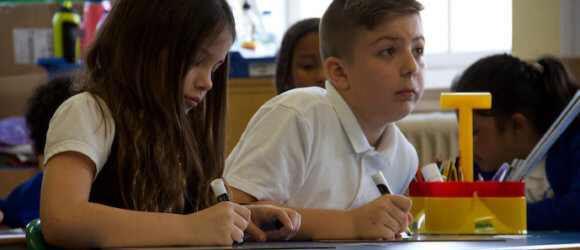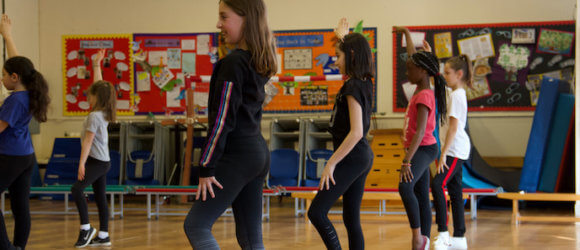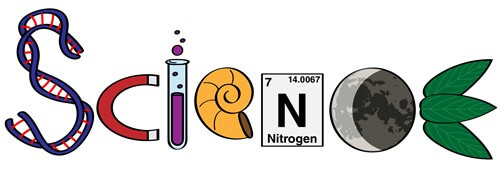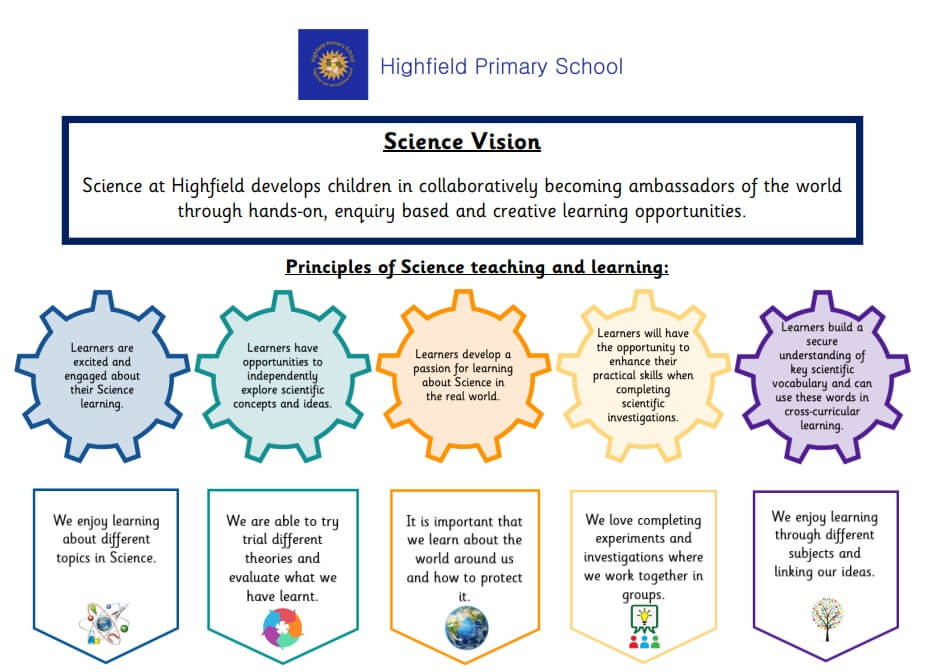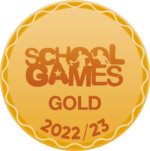Science
Welcome to Science at Highfield
At Highfield, we aim to develop our children’s abilities in Science using an integrated approach that consists of building their scientific knowledge through the specific disciplines of biology, chemistry and physics. These will be taught through following different types of science enquiries, which will help them to develop ideas, questions and answers to scientific concepts and about the world around them. Teachers plan Science so that there are cross-curricular links made with other subjects, including STEM (Science, Technology, Engineering and Maths).
Aims
The national curriculum for Science aims to ensure that all pupils:
- develop scientific knowledge and conceptual understanding through the specific disciplines of biology, chemistry and physics
- develop understanding of the nature, processes and methods of science through different types of science enquiries that help them to answer scientific questions about the world around them are equipped with the scientific knowledge required to understand the uses and implications of science, today and for the future.
Science National Curriculum https://assets.publishing.service.gov.uk/government/uploads/system/uploads/attachment_data/file/425618/PRIMARY_national_curriculum_-_Science.pdf
Working Scientifically at Highfield
‘Working scientifically’ specifies the understanding of the nature, processes and methods of science. This aspect of the curriculum is embedded within the content of biology, chemistry and physics, focusing on the key features of scientific enquiry, so that pupils learn to use a variety of approaches to answer relevant scientific questions. These types of scientific enquiry should include: observing over time; pattern seeking; identifying, classifying and grouping; comparative and fair testing (controlled investigations); and researching using secondary sources. Pupils at Highfield seek answers to questions through collecting, analysing and presenting data. ‘Working scientifically’ will be developed further, once pupils have built up sufficient understanding of science to engage meaningfully in more sophisticated discussion of experimental design and control.
Our Science long term plan 2024-2025 can be found here – Science LTP
Wider Learning
See below for a range of links to websites, online learning resources and DIY Science experiments that link to your child’s learning.
EYFS
Science Activities – https://www.firstdiscoverers.co.uk/early-years-science-activities-eyfs/
DIY Science Activities https://www.science-sparks.com/early-years-science-themed-activities/
Y1 and Y2
Revision Material on Animals – https://www.bbc.co.uk/bitesize/topics/z6882hv
Getting Children in the Garden – http://www.thekidsgarden.co.uk/
Nature Walk Ideas – https://www.woodlandtrust.org.uk/blog/2020/03/nature-detectives/
Habitats Learning – https://www.natgeokids.com/uk/teacher-category/habitats/
South London Botanical Institute – https://www.slbi.org.uk/
Y3 and Y4
RockWatch – https://geologistsassociation.org.uk/children/
Learning Materials on Rocks – https://www.funkidslive.com/learn/geology-rocks/#
Learning Materials for All Topics – https://www.childrensuniversity.manchester.ac.uk/learning-activities/
Experiments based on Light – https://buggyandbuddy.com/light-experiments-for-kids/
Learning Materials on the Digestive System – https://www.natgeokids.com/uk/discover/science/general-science/your-digestive-system/
Learning Materials on Habitats – https://www.natgeokids.com/uk/teacher-category/habitats/
Sound – https://thekidshouldseethis.com/post/schlieren-flow-visualizations-sound
How to Make a Tune Booster – https://learning.sciencemuseumgroup.org.uk/resources/tune-booster/
States of Matter Project Ideas – https://lifestyle.howstuffworks.com/crafts/science-projects/science-projects-for-kids-states-of-matter.htm
How to Make Instant Ice-Cream – https://learning.sciencemuseumgroup.org.uk/resources/instant-ice-cream/
Y5 and Y6
Learning Materials on Earth and Space – https://www.childrensuniversity.manchester.ac.uk/learning-activities/science/the-earth-and-beyond/introduction/
Visit the Space Centre – https://spacecentre.co.uk/
Visit the London Wetlands – https://www.wwt.org.uk/wetland-centres/london/
States of Matter Project Ideas – https://lifestyle.howstuffworks.com/crafts/science-projects/science-projects-for-kids-states-of-matter.htm
Discovering the Circulatory System – https://www.curiscope.co.uk/pages/science-lesson-plans-human-body#circulatory
Learning Materials on Evolution and Inheritance – https://www.bbc.co.uk/bitesize/topics/zvhhvcw
Learning Materials on Habitats – https://www.natgeokids.com/uk/teacher-category/habitats/

